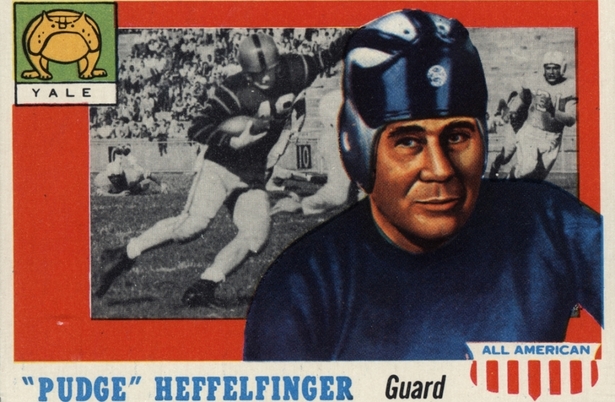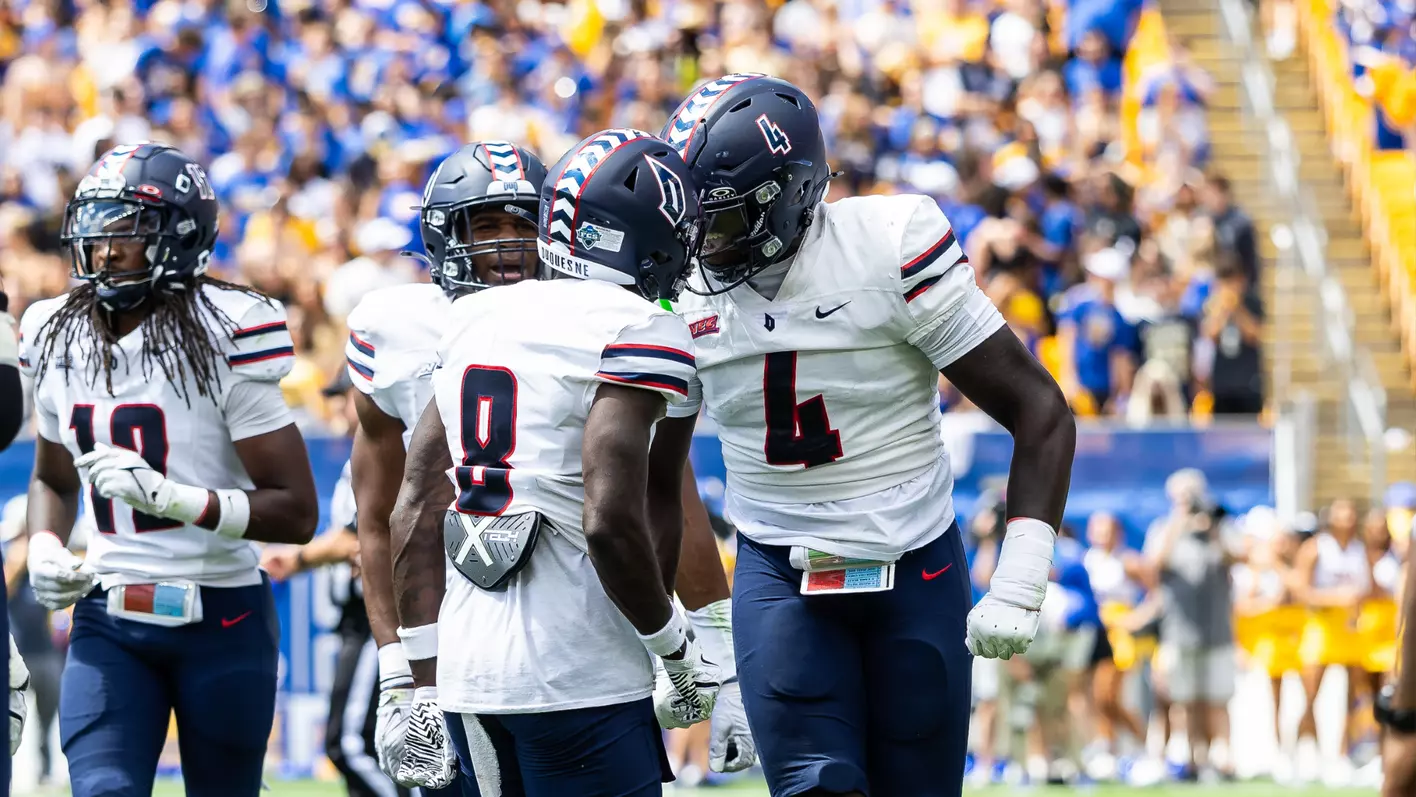GAME THREE, LEHIGH AT DUQUESNE: It Took More Than 70 Years, but Lehigh Football Will Finally Return to Pittsburgh
BETHLEHEM, PA – This weekend Lehigh (2-0, 1-0 Patriot) will go on the team’s first road trip of the season. They are heading across the state to Pittsburgh, PA to face off against Duquesne (1-1, 0-0 NEC) in an out-of-conference clash.
Lehigh and Duquesne are both FCS schools, and have been for a very long time.
Lehigh and Duquesne also have very old football programs – Lehigh’s began back in 1884, while Duquesne’s first recorded game took place in 1893.
So why is this their first-ever meeting?
I took a deep dive as we count down towards the Mountain Hawks first-ever meeting against the Dukes at Rooney field in Pittsburgh.
From my research, I learned that Duquesne had traveled back to Eastern PA to play football games (Villanova), and Lehigh had a not-insignificant presence in the city of Pittsburgh itself. That they didn’t play in the early years might have been a combination of timing, and luck.
Lehigh and Duquesne, however, played a part of early football history in the Pittsburgh area, with intriguing links between the two, without actually having a game between them. To show you how that was the case we need to go all the way back to 1892, where both Lehigh football and Duquesne football share a strange link… to the Pittsburg Athletic Club.

The Pittsburg AC Connection
In the 1890s, football was sweeping across the nation in popularity. Most of it was occurring on college campuses – but not all.
After the civil war, the sport of baseball spread like wildfire in popularity through the land. Amateur clubs popped up in small- and mid-size cities. In the 1880s, the same process started to happen with the new sport of football. The same athletic clubs that sponsored baseball teams started to sponsor football teams as well.
In Pittsburgh, competing athletic clubs formed. One of those was called Pittsburg [sic] AC, or the “East Enders”. Their crosstown Rivals were the Allegheny Athletic Association, or, as they were then known, the 3A’s.
Local athletic clubs adhered to the same athletic rules as college football at the time – there were to be no paid athletes. But Pittsburg AC and the 3A’s would break that norm in 1892 – literally two weeks before Lehigh would make their first-ever trip to Pittsburgh to play a football game.

From ExplorePA.Com, the Rivalry game between Pittsburg AC and the 3A’s was described:
“With its showdown against the 3As fast approaching, Pittsburgh sent a scout to watch [former Yale player and college football Hall of Famer] Pudge Heffelfinger against Cleveland. Shortly after the game, the Pittsburgh press reported that the club made Heffelfinger and another Chicagoan an offer of $250 each to suit up against Allegheny. Then it was 3As turn.
“Organized by a group of Pittsburgh pillars who also had played football at Yale, the Allegheny wanted Heffelfinger badly. They matched Pittsburgh’s offer. When Heffelfinger balked at jeopardizing his amateur standing for $250, they doubled it. On November 12, Heffelfinger and two Chicago teammates stepped onto Recreation Field in Allegheny colors. And then all hell broke loose.”
Eventually Pittsburg AC would agree to play the game under certain conditions, and Pudge Heffelfinger would end up scoring the game’s only touchdown for Allegheny, winning the game 4-0. Since they agreed to play the game – and it almost didn’t happen – Heffelinger became the first-ever professional football player, paid to compete on November 12th.
Hefflefinger at the time was clearly a big star and big draw for the 3As. The fee they paid Pudge was allegedly ten times the cost of the rental of the field itself.
It would be only two weeks later that Lehigh would travel out to Pittsburgh, fresh after a 15-6 win over Lafayette, where they would defeat Pittsburg AC 21-0 in front of 3,000 people. (While the venue isn’t specified in the media account of the game, it’s likely it took place close to the old site of Three Rivers Stadium, longtime home of the Pittsburgh Steelers. That’s where the PAC/3As game was played two weeks prior.)
Two more interesting notes link this chapter to both Lehigh and Duquesne.
One is that “Pudge” Hefflefinger would eventually be hired by Lehigh as a head football coach in 1894. He would last one season at Lehigh, going 5-9 and splitting his two tries at beating Lafayette, going 1-1. Two of the more interesting notes of “Pudge”‘s time at South Mountain was his scheduling of a 14 game schedule in a bit over two months – a brutal schedule – and that one time, he offered a gambling/scouting report of Princeton, Penn and Yale in the Philadelphia papers in the middle of the football season, based on the fact Lehigh had played all three. (“I have no doubt that Princeton will beat Pennsylvania by ten points when they meet on November 10,” he wrote.)
The other involves Duquesne. Pittsburg AC would soldier on as an athletic club team, watching Allegheny eventually discontinue their football team due to the scandals erupting from the blatant professionalism/hiring or “ringers”. In 1898, they would compile a 4-3-2 record, but would be slammed by their new rivals, which were filled with professional players. They would quietly disband after the season.
One of their games in 1898 was a scoreless, fumble-filled tie against a local college that competed against many of the local athletic clubs in and around Pittsburgh – a small college calling itself “Pittsburgh Catholic College of the Holy Ghost”. Later, that school would rename itself Duquesne University.
“Disappointment came, and with it came the proof that as far as yesterday’s game was concerned the PAC and the Pittsburg [sic] College teams are about as evenly matched as any two teams in the western part of the state,” The Pittsburgh Press reported.
Though results like that weren’t cited as a reason why Pittsburg AC decided to disband in 1898, it seems fair to say that both Lehigh and Duquesne’s wins over them certainly didn’t make for a convincing argument.

Fast Forward To Today
More recently, Duquesne has established itself as a team that consistently is competing for the NEC title – and beating nationally ranked teams.
Before the season, Duquesne was picked to finish second in the NEC, which wasn’t a surprise. “This is the 15th consecutive season Duquesne has been picked in the top three of the NEC Preseason Poll,” the Dukes press release said. “The Dukes received two first-place votes and have now garnered at least one first-place vote in 14 of the last 15 preseason polls.”
Duquesne has made a habit of having meaningful November football games, frequently in the NEC title conversation.
In 2018, the Dukes won the NEC and traveled to Towson to play the Towson Tigers of the CAA, and not just beat them, they throttled them 31-10.
Two years ago, the Dukes went 7-4 and qualified for the FCS Playoffs, falling to Youngstown State 40-7. And last year, Duquesne went 8-3, nearly qualifying for the playoffs again before bowing out to Central Connecticut State in the final game to give the Blue Devils the autobid. Earlier in the season, though, the Dukes knocked off nationally-ranked Youngstown State 28-25.
Lehigh is just the second ranked opponent ever to visit Rooney Field — and the first non-conference — since No. 18 CCSU in the 2019 NEC finale.
Lehigh will also be the first FCS team Duquesne has played this year – though they haven’t left Pittsburgh.

That’s because their first game was against the Pitt Panthers, a historic meeting that was Duquesne’s first game against their FBS neighbors in 86 years. While the outcome wasn’t a huge surprise – a 61-9 defeat which doesn’t teach us much – the game in front of more than 53,000 fans in Acrisure stadium was a great moment for the program.
Last week, Duquesne won their home opener in front of fewer fans, but with a better result – a 55-14 win over Lincoln (PA). In the game, the Dukes graduate transfer QB Tyler Riddell went 15-for-20 passing for 239 yards and 5 TDs in the resounding victory.
This week will be a very good test for both teams – two teams who hope to compete for their league titles, two teams who hope to return to the FCS Playoffs this season, and two teams playing themselves for the first time… even though they both beat Pittsburgh AC in the 1890s.
LEHIGH MOUNTAIN HAWKS (2-0, 1-0) AT DUQUESNE DUKES (1-1, 0-0 NEC)
WHERE: Rooney Field/Pittsburgh, PA, Saturday, September 13th, Noon
TV: Fox Sports Net Pittsburgh+
STREAMING: NEC Front Row
TV CREW: PxP – Tim Benz; Analyst – Ellis Cannon
RADIO: BROADCAST (Fox Sports Lehigh Valley 94.7 FM/1230 AM; LVFoxSports.com):
RADIO CREW: PxP – Matt Kerr; Analysts – Steve Lomangino, Connor Brown

Chuck has been writing about Lehigh football since the dawn of the internet, or perhaps it only seems like it. He’s executive editor of the College Sports Journal and has also written a book, The Rivalry: How Two Schools Started the Most Played College Football Series.
Reach him at: this email or click below:
